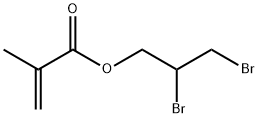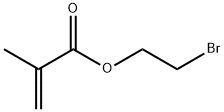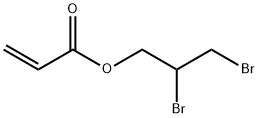2-Bromoethyl acrylate
- CAS NO.:4823-47-6
- Empirical Formula: C5H7BrO2
- Molecular Weight: 179.01
- MDL number: MFCD00013541
- EINECS: 000-000-0
- SAFETY DATA SHEET (SDS)
- Update Date: 2024-12-18 14:08:52

What is 2-Bromoethyl acrylate ?
The Uses of 2-Bromoethyl acrylate
2-Bromoethyl acrylate is utilized in curable and reactive polymers due to the presence of reactive bromine. It is also used in the synthesis of other monomers.
What are the applications of Application
2-Bromoethyl acrylate is a reactive halogen, which has potential use in curable and reactive polymers and in synthesis of other monomers
General Description
Colorless liquid.
Air & Water Reactions
Insoluble in water.
Reactivity Profile
A brominated acylic acid ester. Esters react with acids to liberate heat along with alcohols and acids. Strong oxidizing acids may cause a vigorous reaction that is sufficiently exothermic to ignite the reaction products. Heat is also generated by the interaction of esters with caustic solutions. Flammable hydrogen is generated by mixing esters with alkali metals and hydrides.
Health Hazard
ACUTE/CHRONIC HAZARDS: 2-BROMOETHYL ACRYLATE may be irritating to tissues.
Fire Hazard
Flash point data for 2-BROMOETHYL ACRYLATE are not available. 2-BROMOETHYL ACRYLATE is probably combustible.
Chemical Reactivity
Light and heat sensitive Incompatible with strong oxidizing agents, polymerizing agents and peroxides.
Properties of 2-Bromoethyl acrylate
| Boiling point: | 52-53°C 5mm |
| Density | 1.4581 |
| refractive index | 1.4660 (estimate) |
| Flash point: | 52-53°C/5mm |
| storage temp. | -20° C |
| Water Solubility | Miscible with water. |
| BRN | 1749713 |
| InChI | InChI=1S/C5H7BrO2/c1-2-5(7)8-4-3-6/h2H,1,3-4H2 |
| CAS DataBase Reference | 4823-47-6(CAS DataBase Reference) |
| EPA Substance Registry System | 2-Bromoethyl acrylate (4823-47-6) |
Safety information for 2-Bromoethyl acrylate
| Signal word | Warning |
| Pictogram(s) |
 Exclamation Mark Irritant GHS07 |
| GHS Hazard Statements |
H315:Skin corrosion/irritation H319:Serious eye damage/eye irritation H335:Specific target organ toxicity, single exposure;Respiratory tract irritation |
| Precautionary Statement Codes |
P261:Avoid breathing dust/fume/gas/mist/vapours/spray. P304+P340:IF INHALED: Remove victim to fresh air and Keep at rest in a position comfortable for breathing. P305+P351+P338:IF IN EYES: Rinse cautiously with water for several minutes. Remove contact lenses, if present and easy to do. Continuerinsing. P405:Store locked up. |
Computed Descriptors for 2-Bromoethyl acrylate
| InChIKey | CDZAAIHWZYWBSS-UHFFFAOYSA-N |
| SMILES | C(OCCBr)(=O)C=C |
New Products
Tert-butyl bis(2-chloroethyl)carbamate 4-Methylphenylacetic acid N-Boc-D-alaninol N-BOC-D/L-ALANINOL 3-Morpholino-1-(4-nitrophenyl)-5,6-dihydropyridin- 2(1H)-one Furan-2,5-Dicarboxylic Acid Tropic acid 1,1’-CARBONYLDIIMIDAZOLE DIETHYL AMINOMALONATE HYDROCHLORIDE R-2-BENZYLOXY PROPIONIC ACID 1,1’-CARBONYLDI (1,2-4 TRIAZOLE) N-METHYL INDAZOLE-3-CARBOXYLIC ACID (2-Hydroxyphenyl)acetonitrile 4-Bromopyrazole 5-BROMO-2CYANO PYRIDINE 5,6-Dimethoxyindanone 5-broMo-2-chloro-N-cyclopentylpyriMidin-4-aMine 2-(Cyanocyclohexyl)acetic acid 4-methoxy-3,5-dinitropyridine 2-aminopropyl benzoate hydrochloride 1-(4-(aminomethyl)benzyl)urea hydrochloride diethyl 2-(2-((tertbutoxycarbonyl)amino) ethyl)malonate tert-butyl 4- (ureidomethyl)benzylcarbamate Ethyl-2-chloro((4-methoxyphenyl)hydrazono)acetateRelated products of tetrahydrofuran








You may like
-
 2-Bromoethyl acrylate, stabilized with 0.1% 4-methoxyphenol CAS 4823-47-6View Details
2-Bromoethyl acrylate, stabilized with 0.1% 4-methoxyphenol CAS 4823-47-6View Details
4823-47-6 -
 1975-50-4 98%View Details
1975-50-4 98%View Details
1975-50-4 -
 2-HYDROXY BENZYL ALCOHOL 98%View Details
2-HYDROXY BENZYL ALCOHOL 98%View Details
90-01-7 -
 2-Chloro-1,3-Bis(Dimethylamino)Trimethinium Hexafluorophosphate 221615-75-4 98%View Details
2-Chloro-1,3-Bis(Dimethylamino)Trimethinium Hexafluorophosphate 221615-75-4 98%View Details
221615-75-4 -
 61397-56-6 CIS BROMO BENZOATE 98%View Details
61397-56-6 CIS BROMO BENZOATE 98%View Details
61397-56-6 -
 14714-50-2 (2-Hydroxyphenyl)acetonitrile 98+View Details
14714-50-2 (2-Hydroxyphenyl)acetonitrile 98+View Details
14714-50-2 -
 118753-70-1 98+View Details
118753-70-1 98+View Details
118753-70-1 -
 733039-20-8 5-broMo-2-chloro-N-cyclopentylpyriMidin-4-aMine 98+View Details
733039-20-8 5-broMo-2-chloro-N-cyclopentylpyriMidin-4-aMine 98+View Details
733039-20-8